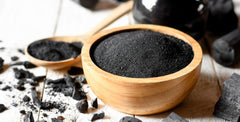Most of us do it every morning and every evening, for 2 minutes. Brushing your teeth is the basis of good oral care. We also floss, floss, rinse and bleach. Who doesn't want sparkling clean, radiant white teeth and fresh breath? Unfortunately, there is often quite a bit wrong with the products we use for this purpose. Here we list 5 of the most commonly used oral products and give you less toxic alternatives.
Toothpaste without fluoride
The problem with toothpaste: often contains SLS, fluoride (did you know that several studies have shown a link between high fluoride exposure and a decrease in IQ?), artificial sweeteners such as aspartame (possibly carcinogenic) and saccharin, diethanolamine (may cause cancer). contain by-products), propylene glycol (linked to kidney and liver damage), triclosan (among other things, hormone disrupting), microbeads (plastic), chemical dyes such as Red 40 and Blue 1 (linked to hyperactivity, allergies and cancer)... The list goes on and on .
Less toxic alternative: Dr Bronners toothpaste without fluoride (peppermint). This toothpaste is free from the above nasties and contains no artificial colours, flavours, preservatives or sweeteners.
Toothbrush without microplastics
The problem with toothbrushes: almost always made of plastic.
Less toxic alternative: wooden or bamboo toothbrushes or attachments (for your electric toothbrush) can be found everywhere these days. But here's the catch: these toothbrushes usually just have nylon bristles, or petroleum-based plastic. Recycled or not, it remains plastic. And that plastic is what goes into your mouth... Fortunately, we found a toothbrush from Redecker that is made of beech wood and has natural animal hairs. So 100% plastic-free.
Dental floss without PFAS
The problem with dental floss: it often contains nylon, Teflon ( PFAS !), synthetic wax (made from petroleum) and fluorine. The 'fresh' mint scent is often also synthetic: hello phthalates! And what about all those plastic containers that end up in masses at the same time on the landfill?
Less toxic alternative: this silk, odorless dental floss from RADIUS is our favorite so far. Silk dental floss is a natural material and does not contain synthetic chemicals such as PFAS.
Natural mouthwash
The problem with mouthwash: often contains triclosan and listerine, which is also used to disinfect wounds. It kills not only the bad but also the good bacteria and is associated with all kinds of health risks. Diabetes, for example. Chlorhexidine is also widely used in mouthwash and can discolor your teeth.
Less toxic alternative: organic unroasted sesame oil or coconut oil. According to the age-old Ayurvedic ritual Gandusha (oil pulling), you rinse your mouth (before tongue scraping ) with coconut oil or unroasted sesame oil to clean your teeth and gums. It ensures less plaque, whiter teeth and fresh breath. Then brush and drink a large glass of water – possibly with some lemon juice. Goodbye bad mouth bacteria.
Natural whitening
The problem with whitening: many whitening products contain questionable ingredients. Sodium fluoride, for example. This can cause irritation to the skin, eyes and even the lungs.
Less toxic alternative: activated charcoal is a healthier way to whiten your teeth. It helps remove stains and discolorations and provides a whiter smile. It is free of fluoride. Rinsing with coconut oil can also whiten teeth.
Oh yes, and by the way…
Have you had braces in the past and then had splints stuck behind your teeth to keep things straight? Then there is a good chance that these wires contain nickel and therefore emit nickel. If you are very sensitive to this, you may want to consider having it removed. For example, by a holistic dentist. Amalgam fillings - which were widely used in the past - can also play a role in your health, because they release mercury. This kind of 'metal load' can have consequences for the functioning of your organs. Just so you know!
Disclaimer (Do Your Own Research): We love to share with you our experiences and knowledge that we have gained in our search for a toxic-free life. At the same time, we would like to emphasize that you are solely responsible for your health (that goes without saying, right?). The information we share here is for general educational purposes and is not personalized medical advice. Everyone is unique, and what works for one person may not work for another.
*This blog contains affiliate links, which means if you click on the affiliate link and purchase an item, we will receive a commission. This allows us to test new products and expand the less toxic community. Want to know more about how we select products and maintain our integrity? View our selection procedure .





